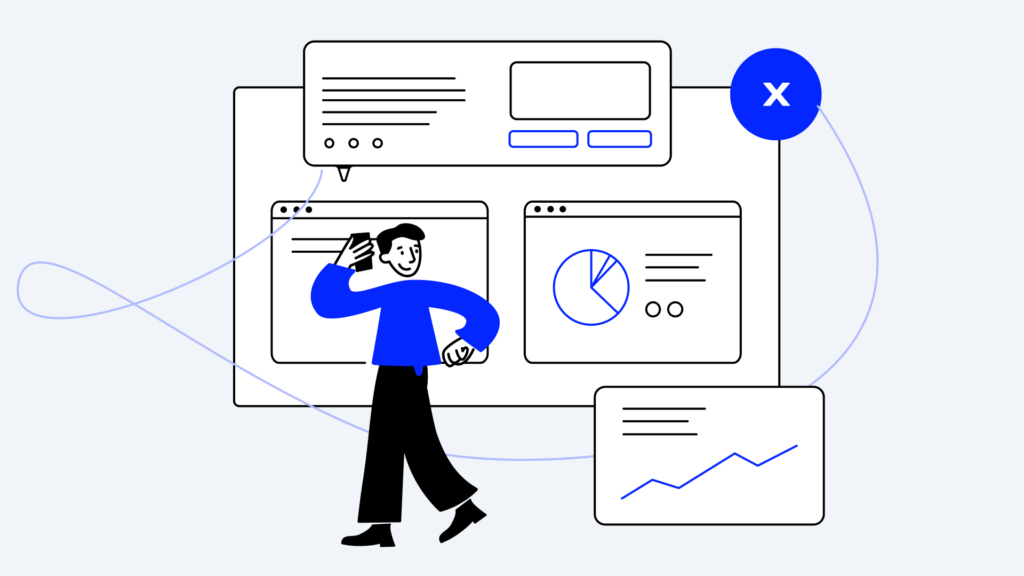The Future of Communication: VoIP numbers and how they work

According to Telzio’s internal surveys, the average company can save between 30 and 50 % of costs by switching to VoIP. A VoIP number offers a blend of flexibility, cost-efficiency, and advanced functionalities.
Unlike traditional phone lines, VoIP uses the internet to enable calls from any device with internet access – improving your connectivity without tying you down.
If you like to see these kinds of numbers for your company, read on!
Key takeaways:
- VoIP numbers offer flexibility and cost savings, allowing calls from anywhere with an internet connection. There are no geographical limits or extra costs.
- VoIP numbers can include toll-free and vanity options for branding..
- If you are concerned about the security of VoIP numbers and want to comply with legal regulations, you should choose a provider that uses encryption, secure login methods and regularly updates its software.
Was ist eine VoIP-Nummer?
A VoIP number works like a regular telephone number but uses an internet connection for its operation. Unlike traditional numbers that are tied to a fixed location, Voice over IP numbers are linked to the user. This means you can use your number from any location via any VoIP phone application that is compatible with both mobile devices and computers.
VoIP vs. Landline
VoIP uses internet technology to make calls, offering lower costs, advanced features like video calls and messaging, and the flexibility to call from various devices anywhere with an internet connection.
Traditional landlines rely on copper wire infrastructure. They are known for their reliability and consistent quality but tend to be more expensive, especially for long-distance calls, and offer fewer advanced features.
While VoIP is great for growing and working with digital tools, landlines remain a good option for anyone wanting simple, reliable calling without depending on the internet.
Learn more how VoIP vs Landline can compare.
How does the VoIP number work?
VoIP technology works by turning data-driven devices like a computer or a tablet into phones that you can call from. A VoIP number is, therefore, a virtual number and you need stable internet access to use it.
Once set up, you can initiate outbound calls and receive incoming ones over your Internet or VoIP network, bypassing the conventional public switched telephone network (PSTN) that operates through phone lines.
With VoIP phone numbers you also gain the flexibility to initiate calls worldwide without additional costs. By leveraging solutions like CloudTalk, which provides 160+ international numbers, you can streamline your business communication without geographical barriers.
Types of VoIP Numbers
A significant advantage of VoIP is the ability to use different types of numbers. Each type offers unique benefits, catering to different business strategies, operational models, and customer engagement approaches.
Here’s a closer look at these types:
1. Fixed (Geographical) VoIP Numbers
These numbers are associated with a specific geographical location or area code like +1 for the USA or +44 for the UK. They are ideal for businesses or individuals who want to maintain a local presence in a particular city, region, or country.
By making your business look local and easily accessible, customers feel like they are dealing with someone from their local area, which increases their trust in you.
An example would be a real estate agency in Los Angeles that uses a fixed VoIP number with an LA area code to reinforce its presence in the local market, even if its agents operate from different locations.
2. Non-fixed (Non-geographical) VoIP Numbers
These VoIP numbers are not tied to a specific geographical location. They offer flexibility for businesses and individuals who operate on a national or global scale. You can be sure that your contact number remains consistent, regardless of where you or your business moves. Local numbers also save you money by reducing long-distance charges.
For instance, a sales rep who travels frequently can use a non-geographical number to ensure clients can reach him anywhere, without the need to change contact information.
3. Toll-free Numbers
Toll-free numbers allow callers to reach businesses without being charged for the call, regardless of the caller’s location.
These numbers typically start with prefixes like 800, 888, 877 in the USA or 0800 or 0808 in the UK.
You can use such numbers if you want to offer support or services to your customers without charging the caller. Doing so minimizes the customer’s reluctance to make a call.
A nationwide customer support center often uses a toll-free number to encourage customers from anywhere in the country to call with inquiries or issues without concern over long-distance charges.
4. Vanity Numbers
Vanity numbers spell out a word or phrase on the dial pad or feature an easily remembered sequence of numbers. They are usually used for branding or marketing purposes.
When you are looking to increase your brand recognition and recall among your target audience then a vanity number is a memorable alternative to random digits, making them a powerful marketing tool.
For example, a flower delivery service utilizes 1-800-FLOWERS as its vanity number, making it simple for customers to remember and contact the business when they want to order flowers.
4 Benefits of a VOIP number
A VoIP number is especially appealing to small and mid-size businesses (SMBs). By 2025, SMBs are likely to grow by more than 15% in the VoIP market. A report from Blueface shows that 61% of companies have already switched to a VoIP-based system after their contract with landline carriers expired.
The main benefits of VoIP phone numbers:
#1 Save Costs
Leveraging VoIP technology translates into substantial cost reductions. When you use the Internet for voice communication, you bypass traditional telecommunications infrastructures and cut the cost of long-distance and international calls.
A startup, for example, can then allocate funds saved from reduced communication costs toward innovation and growth initiatives.
You might suffer like PlanRadar from the limitations of fixed phone numbers, lack of international phone numbers for desired countries and poor call quality. CloudTalk provided PlanRadar with a custom tailored and flexible VoIP solution that transformed PlanRadar’s communication and helped them achieve their goals. They saw a 70% increase in call handling efficiency, and a 20% increase in team productivity, leading to a staggering 122% growth in call volume.
#2 Embrace Flexibility
VoIP’s inherent flexibility allows you to make and receive calls from anywhere in the world on any internet-enabled device, such as smartphones, laptops, or VoIP handsets.
Sales teams can stay connected with clients and the office whether they’re working from home, in transit, or at a client site, ensuring no opportunity is missed.
A company with a global workforce that uses VoIP to offer flexible working arrangements, can attract top talent from around the world.
#3 Utilize Advanced Features
Additionally, VoIP technology comes with advanced features like call forwarding, voicemail to email, and AI powered call transcription, which can improve productivity and collaboration. A multinational corporation may utilize online conferencing to conduct regular meetings across continents, improving collaboration while reducing travel costs.
#4 Support Growth with Scalability
As your business evolves, so do your communication needs. VoIP services easily scale to accommodate growth, allowing you to add or remove lines and services without complex infrastructure changes.
For instance, a rapidly expanding e-commerce company can effortlessly add new customer service lines during peak shopping seasons.
A study conducted by McKinsey found that a lack of scalable software solutions could cost businesses anywhere between 8% and 28% in revenue losses.
- Enhance Customer Engagement
VoIP enhances interactions with customers through sophisticated call routing, Interactive Voice Response (IVR), and customized on-hold messaging, ensuring that customer inquiries are handled efficiently and professionally.
A retail business, for instance, implements an IVR system to route customer calls to the appropriate department, reducing waiting times and improving customer satisfaction.
- Utilize Integration Capabilities
The ability to integrate with a broad array of business applications and CRM systems means VoIP can streamline business operations, improve data management, and enhance customer interactions.
A healthcare provider for example can integrate its VoIP system with patient management software to streamline appointment scheduling, reminders, and follow-ups.
How to get a VOIP number
Setting up VoIP numbers is straightforward and often cheaper than traditional phone numbers. Most VoIP systems are managed off-site, reducing or eliminating the need for equipment on your premises.
Here’s how to do it in 6 detailed steps:
Step 1: Pinpoint Your Business Needs
Evaluate what your business really needs from its communication system. Consider the importance of cost-effectiveness, robust security measures, consistent reliability, and high-quality service.
Check the online reviews on the quality of customer support from the various providers. CloudTalk, for example, is known for a response time of less than a minute.
Step 2: Select the Ideal Provider and Plan
Research and choose a provider that aligns with your specific requirements.
For example, companies like CloudTalk offer various plans to fit different business sizes and needs. A Custom Plan is particularly useful for businesses with unique demands, as it allows for a more personalized setup.
Step 3: Acquire Your VoIP Number
After deciding on a provider, you’ll work with a Customer Success Manager (CSM) who guides you through the process of obtaining your VoIP number. This step usually happens swiftly after you’ve committed to a plan, enabling a quick transition to VoIP communications. You can acquire a new VoIP number, or, if you would like to keep your current phone number, choose a provider that offers number portability.
Step 4: Configure Your VoIP Setup
With your VoIP number in hand, the next move is to configure your system. Set up your new VoIP phone number and make sure your devices are ready to make and receive calls. This step is vital to be able to use the full range of VoIP functions.
Step 5: Deploy the Required Software or Hardware
Implement the VoIP software across your devices or install VoIP-enabled phones as needed. Many providers also offer mobile applications, making it easier to integrate VoIP functionality into your everyday mobile usage.
Step 6: Test and Validate Your Setup
Finally, thoroughly test your new VoIP number and system. Place several test calls to check the clarity of the sound and the functionality of any special features you’ve set up. The testing phase ensures that your business communications will run smoothly and efficiently.
Get your VOIP number now.

VoIP Number Security and Compliance
Like all internet-connected technologies, VoIP is vulnerable to misuse by cybercriminals and fraudsters aiming to harm your business.
Attackers who hack your phone system can listen in on conversations, rack up large phone bills, or steal important data about your business and customers. Their harm doesn’t end there; they may use the stolen information to imitate your business or demand a ransom by threatening to leak confidential details.
The good news is that securing your calls and data is achievable through basic cybersecurity practices.
Here’s how businesses can navigate these challenges:
#1 Encryption and Secure Connections
Utilize end-to-end encryption for all VoIP calls to protect data from interception. It will shield your sensitive information from cyber intrusions. In case your communication is intercepted, robust encryption makes it indecipherable to attackers.
#2 Strong Authentication Methods
Implement robust authentication protocols for accessing VoIP systems. Ensure the creation of strong and unique passwords for each device connected to your VoIP system. Multi-factor authentication (MFA) adds an extra layer of security, significantly reducing the risk of unauthorized access.
#3 Regular Software Updates
Maintain the latest updates for all utilized software and tools. VoIP service providers diligently strive to protect the information stored and transmitted on their platforms against cyber threats. Various security functions are implemented in the system, which are constantly evaluated in order to uncover potential security gaps. Regular maintenance and updates help protect your system against new threats.
#4 Compliance with Regulations
Stay informed about VoIP use regulations, such as GDPR in Europe for data protection and TCPA in the US for telemarketing practices. Ensuring compliance helps avoid legal penalties and enhances customer trust.
#5 Secure Network Infrastructure
Protect your network with firewalls, anti-virus programs, and intrusion detection systems. Conduct frequent security assessments of your network to identify and rectify vulnerabilities.
#6 Employee Training and Awareness
Educate your team about VoIP fraud, DDoS attacks, and Vishing schemes that could compromise your VoIP system. Knowledgeable employees are less likely to inadvertently expose your system to risks.
Conclusion
VoIP’s scalability ensures that it can grow with your business, adapting to changing needs without the need for costly hardware upgrades. With its blend of efficiency, versatility, and cost-effectiveness, VoIP technology is a strategic investment for any organization looking to optimize its communication infrastructure.
Deciding on the best communication tool for your business?
FAQs
What is VOIP?
VoIP stands for Voice over Internet Protocol. This technology allows you to make calls over a broadband internet connection. With this technology, your voice is converted into a digital signal that is transmitted over the internet and the signal is converted back into a normal telephone signal before it reaches the person you are calling.
What are the advantages and disadvantages of VoIP?
Advantages: VoIP offers significant cost savings, especially on international calls, provides flexibility to make calls from anywhere with an internet connection, and includes advanced features like voicemail to email and call forwarding.
Disadvantages: It relies heavily on internet connectivity, with poor internet leading to dropped calls or low-quality audio. It also needs more power reliability than traditional phone systems during outages.
How much does a VoIP cost?
Seeing „VoIP“ after a phone number signifies that the number operates over the Internet Protocol, using the Internet for voice communication, rather than through traditional telephone lines. This often implies greater flexibility and features compared to standard phone services.
How to find a VoIP phone number?
To obtain a VoIP phone number, you’ll need to sign up with a VoIP service provider like CloudTalk. Upon registration, you can choose a new number from a range of options or port an existing number in many cases, depending on the provider’s capabilities and service offerings.
Why would someone want a VoIP number?
Individuals and businesses choose VoIP numbers for their versatility, allowing calls on various devices, including phones, laptops, and tablets, from any location with internet access. The cost-effectiveness, coupled with advanced communication features, makes VoIP an attractive choice for modern telecommunication needs.
Is a VoIP number a real number?
Yes, a VoIP number functions as a real phone number, enabling you to make and receive calls similarly to traditional phone numbers. The key difference lies in its operation over the Internet, offering greater functionality and flexibility.
Can I keep my existing phone number when switching to a VoIP number?
Yes, retaining your current phone number when transitioning to a VoIP service is possible if your provider offers number porting. This procedure enables the transfer of your existing number from a traditional phone service to your new VoIP system. Be aware, though, that this transfer might require several days to complete and could incur extra fees.
















